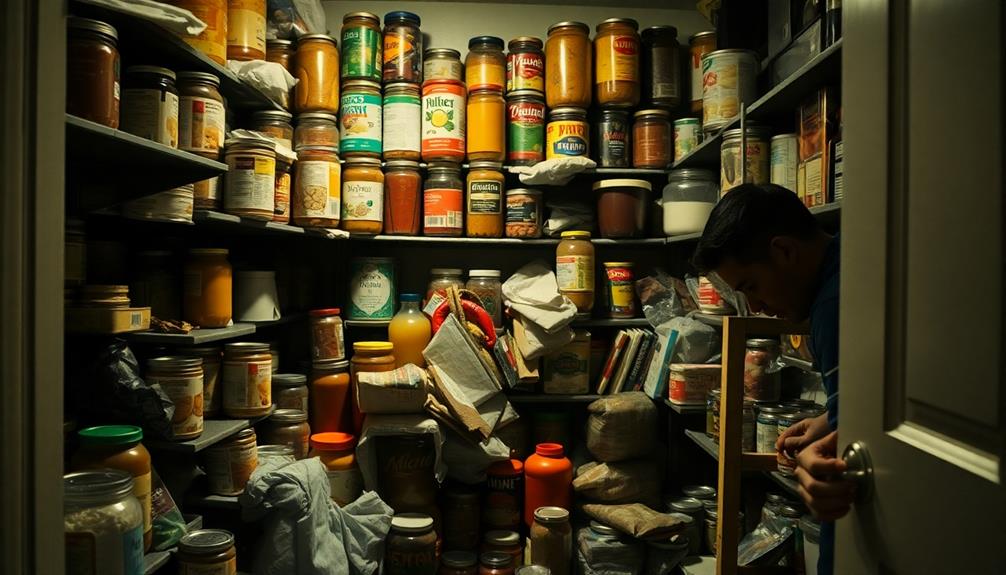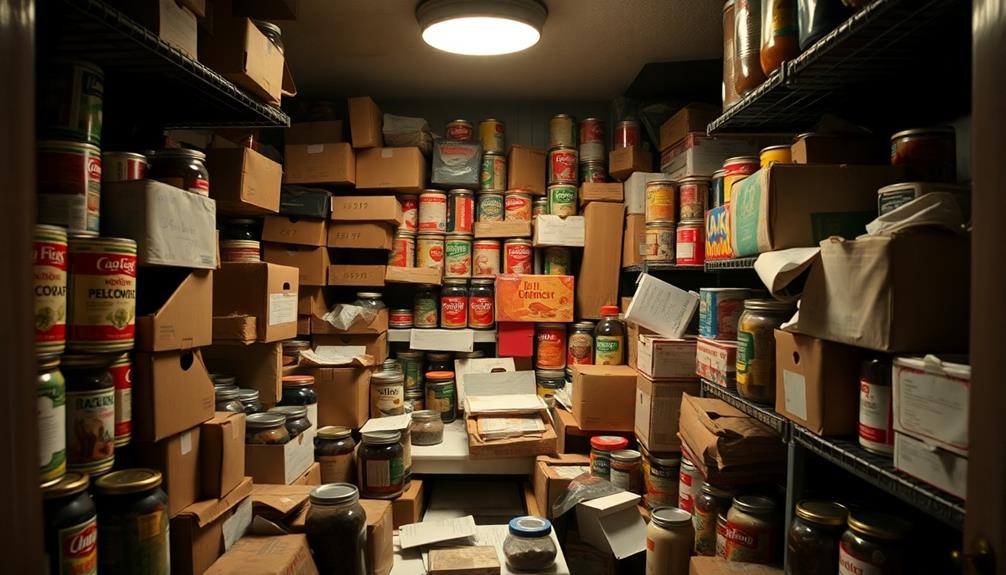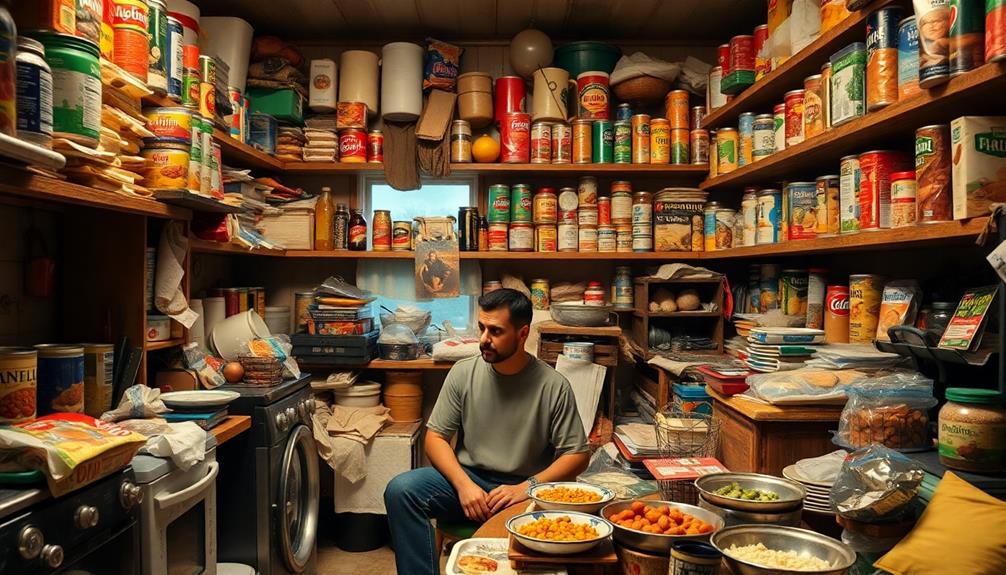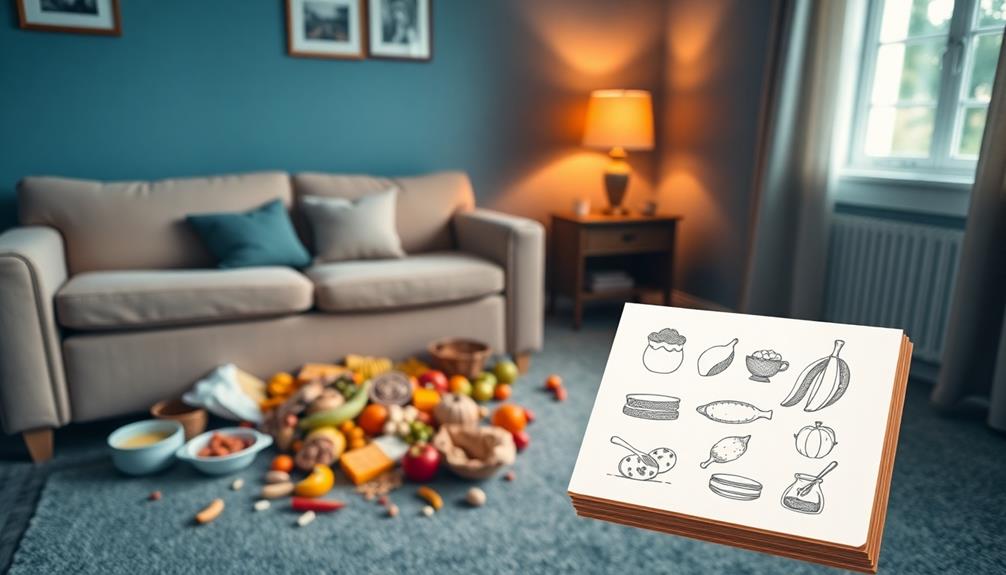Food hoarding often stems from deep-seated emotional issues rooted in past traumas and feelings of insecurity. You might find yourself accumulating food due to a fear of scarcity or an emotional connection to certain items. This behavior can lead to anxiety about running out of food, even if you have plenty stored away. It's not uncommon for individuals to struggle with discarding spoiled items because of these emotional attachments. Understanding the psychology behind this behavior can help you break the cycle and improve your relationship with food. Discovering more about effective strategies can guide you toward healthier habits.
Key Takeaways
- Food hoarding is often linked to emotional attachments and fears of scarcity, rooted in anxiety disorders and childhood experiences of food insecurity.
- Behavioral indicators of food hoarding include excessive purchasing, difficulty discarding spoiled food, and persistent anxiety about running out of food.
- Emotional attachments to food serve as comfort and nostalgia, often leading to over-purchasing due to perceived scarcity.
- Cognitive Behavioral Therapy (CBT) and mindful eating practices are effective treatment approaches for addressing food hoarding behaviors.
- Early intervention and a combination of therapy and nutritional counseling significantly improve recovery outcomes for individuals with food hoarding tendencies.
Understanding Food Hoarding

Food hoarding isn't just a quirky habit; it's a serious psychological issue. When you struggle with food hoarding disorder, you may find yourself accumulating food items excessively, driven by deep emotional attachments and fears of scarcity. This isn't just about disorganization; it's a complex interplay of anxiety disorder and disordered eating that complicates your decision-making process.
Many people may find comfort in food due to its cultural significance, like enjoying traditional dishes such as Caldeirada or sweets like Brigadeiro, which can evoke nostalgia and emotional connections to their heritage.
You might notice that past experiences of food insecurity greatly influence your perception of food's value, pushing you toward hoarding behaviors. Instead of enjoying meals, you may feel the need to stockpile, believing that having more food will protect you from future shortages. This behavior often serves as an avoidance coping mechanism, distracting you from underlying emotional pain or trauma.
Understanding the psychological roots of food hoarding is vital for effective treatment and recovery. It's important to recognize that the issues at play go beyond simply collecting too much food; they're tied to your emotional history and mental health.
Signs of Food Hoarding

When you start noticing an overabundance of food in your home, it might be a sign of food hoarding. This behavior often manifests through excessive purchases without immediate need, resulting in overcrowded pantries and freezers. If you find it difficult to discard expired or spoiled food due to emotional attachment, you're likely displaying hoarding behavior.
You might also be hiding food stashes, fearing judgment or intervention from others. This indicates a desire to avoid social scrutiny, which is common among food hoarders. Persistent anxiety about running out of food can even arise, despite having a surplus, showing a disconnect between your actual food availability and perceived need.
Here's a quick reference table summarizing the signs:
| Signs of Food Hoarding | Description |
|---|---|
| Excessive Food Purchases | Buying food without a clear need |
| Difficulty Discarding Food | Emotional attachment to expired or spoiled items |
| Hiding Food | Avoiding social judgment and scrutiny |
Recognizing these signs can help you address potential food hoarding behaviors and the underlying anxiety associated with them.
Psychological Impacts

Throughout life, the psychological impacts of food hoarding can be profound and far-reaching. You might find that food hoarding often stems from feelings of inadequacy and a fear of not having enough, potentially rooted in childhood experiences of food insecurity. This behavior can lead to emotional damage, especially when combined with disordered eating, creating a cycle of inner hunger that excessive food accumulation attempts to fill.
For instance, traditional dishes like Muamba De Galinha in Angola are often made during family gatherings, highlighting the emotional connections we've with food and the potential for these connections to influence hoarding behaviors.
Emotional regulation issues can arise as survival-focused behaviors develop in response to childhood trauma. These issues can make it challenging for you to manage emotions effectively, heightening the urge to hoard food.
Additionally, the connection between food hoarding and attachment theory suggests that insecure attachments in childhood can affect your ability to trust that your needs for food will be met.
As a result, you may find yourself engaging in obsessive behaviors surrounding food, which can link directly to eating disorders like binge eating and bulimia.
Recognizing these psychological impacts is essential, as they can perpetuate the cycle of food hoarding and make it difficult to break free from these patterns. Understanding this can be the first step toward healing.
Causes of Food Hoarding

Understanding the psychological impacts of food hoarding reveals underlying causes that often trace back to early life experiences. Many individuals who hoard food may have faced childhood neglect or unmet basic needs, fostering a survivalist mentality.
This early scarcity can lead to an overwhelming desire to guarantee that their needs are met, which often manifests through compulsive behaviors. For instance, those who grew up in environments where food was scarce may develop a profound connection to food, akin to the way traditional Ethiopian dishes like Yekolo (Roasted Barley) reflect a resourceful approach to sustenance.
Here are some key causes of food hoarding:
- Childhood neglect that creates a fear of running out of essential resources.
- Psychological factors such as anxiety disorders that heighten feelings of insecurity.
- Premature self-reliance developed from early experiences, impacting emotional regulation.
- Co-occurring conditions, like eating disorders, that complicate the relationship with food.
These factors intertwine, making food hoarding a complex behavior rooted in past traumas and current psychological challenges.
When you recognize these causes, it becomes clear that food hoarding isn't just about the food itself; it's a coping strategy shaped by a lifetime of experiences and emotional responses.
Understanding these elements is vital for addressing and potentially overcoming hoarding behaviors.
Emotional Attachments to Food

When you think about food, it often brings comfort and warmth, especially during tough times.
Dishes like Mushroom Masala can evoke feelings of nostalgia and satisfaction, reinforcing these emotional connections.
This emotional connection can lead to a fear of scarcity, pushing you to hold onto items long after they're needed.
Understanding these attachments is essential for addressing the reasons behind food hoarding and fostering a healthier relationship with what you eat.
Food as Comfort
Food often serves as a powerful source of comfort, connecting us to cherished memories and emotions. During times of stress or uncertainty, you might find yourself turning to food not just for nourishment but as a coping mechanism. This behavior often stems from a desire for emotional regulation, particularly when feelings of inadequacy or past trauma resurface. The act of eating can trigger the release of dopamine, the feel-good neurotransmitter in the brain, which can provide a temporary sense of relief and pleasure. This phenomenon is known as “food euphoria,” and the science behind food euphoria can help explain why we turn to food for comfort during trying times. Understanding the psychological and physiological impact of food on our emotions can provide insight into our patterns of emotional eating and help us develop healthier coping strategies. While food can bring temporary relief, it’s important to recognize why some people experience food euphoria more intensely than others. Factors such as genetics, personal history, and current mental health can all play a role in how individuals respond to food as a coping mechanism. By understanding these factors, individuals can begin to explore alternative ways of managing their emotions and seeking support when needed. Ultimately, developing a healthier relationship with food and finding effective coping strategies can lead to greater emotional well-being.
Traditional dishes, such as bulgogi or kimchi, can evoke strong ties to cultural heritage, enhancing the emotional experience of eating. When you hoard food, it may be an attempt to regain a sense of control over your environment and future.
Here are some aspects that illustrate this connection:
- Family gatherings: Comfort foods that remind you of home-cooked meals shared with loved ones.
- Celebratory treats: Desserts that mark special occasions, evoking joy and nostalgia.
- Childhood snacks: Items that transport you back to simpler times, offering solace in distress.
- Crisis comfort: Foods you turn to during tough times, providing a temporary escape from anxiety.
Understanding the emotional purpose behind food hoarding is essential. It helps you address the underlying issues related to survival fears and emotional attachments, rather than merely focusing on the behaviors themselves.
Fear of Scarcity
Experiencing comfort through food can sometimes lead to deeper issues, particularly when it comes to the fear of scarcity. This fear often roots itself in childhood experiences of neglect or food insecurity, creating a survival mentality that drives your food hoarding behaviors.
You might find yourself accumulating more food than you can consume, fueled by emotional attachments to food that evoke feelings of comfort and security. For many, traditional dishes like squash casserole or boiled peanuts may evoke memories of family gatherings, further complicating these emotional connections.
These strong emotional connections can intensify your belief that hoarding food is vital for safety and stability. When you perceive food as a limited resource, anxiety can take hold, prompting you to over-purchase and stockpile supplies. Each item in your pantry may serve as a buffer against feelings of vulnerability and uncertainty about the future.
Understanding the emotional purpose behind your food hoarding is essential. Instead of merely addressing the behavior, focus on the underlying fears of scarcity that drive it.
Treatment Approaches

When it comes to treating food hoarding, Cognitive Behavioral Therapy (CBT) can help you challenge negative thoughts and build healthier habits.
Incorporating mindful eating practices can also be beneficial, allowing individuals to appreciate the flavors and cultural significance of various dishes, such as Asian cuisine.
Nutritional counseling also plays an essential role in restoring your relationship with food and promoting balanced eating practices.
Cognitive Behavioral Therapy
Cognitive Behavioral Therapy (CBT) offers an effective approach for addressing food hoarding by targeting the negative thought patterns and behaviors that underpin this issue.
By understanding the relationship between food and emotional well-being, you can learn to identify and challenge the beliefs that contribute to your hoarding, helping you break free from anxiety and improve your decision-making skills.
For instance, exploring the joy of seasonal dishes, like Nettle and Potato Soup, can help shift your focus from scarcity to abundance.
Through CBT, you can expect to engage in several practices:
- Coping strategies: Develop tools to manage anxiety related to food and possessions.
- Exposure therapy: Face triggering situations gradually, decreasing avoidance behavior over time.
- Skills training: Learn organization and planning skills for more effective food purchasing and storage.
- Psychological improvements: Experience significant enhancements in both mental well-being and functional aspects of your life.
Nutritional Counseling Benefits
Nutritional counseling plays an essential role in helping those struggling with food hoarding by fostering a healthier relationship with food. By addressing the psychological aspects of food consumption, nutritional counseling allows you to explore emotional attachments to food, which can often contribute to hoarding behaviors.
For instance, dishes like Red-Braised Pork Belly can evoke strong memories and feelings, making it important to understand the emotional connections we've with certain foods. Through this approach, you learn mindful eating practices that encourage awareness and intentionality with each meal.
Additionally, nutritional counseling emphasizes balanced nutrition, helping you recognize and alleviate deficiencies that may arise from hoarding. You'll work on meal planning and cooking skills, empowering you to make healthier food choices while reducing reliance on processed foods.
This practical guidance not only enhances your diet but also builds your confidence in managing food inventory. As you engage in this process, you'll find that the support from a nutritionist can provide effective strategies to tackle food scarcity anxiety.
Supportive Recovery Strategies
Recovery from food hoarding requires a multifaceted approach that combines various treatment strategies to effectively address the underlying issues.
Supportive recovery strategies play a vital role in your journey toward healthier eating habits and overcoming hoarding behaviors. By incorporating therapy and nutritional counseling, you can work on changing disordered thoughts and behaviors, while also restoring a positive relationship with food.
Exploring diverse culinary options, such as traditional dishes like Dorayaki (Red Bean Pancake), can also help in appreciating food in a new light.
Here are some effective strategies to take into account:
- Cognitive Behavioral Therapy (CBT): This helps you identify and change negative thought patterns related to food hoarding.
- Nutritional Counseling: Engaging with a nutritionist can guide you in making diverse and healthier dietary choices.
- Addressing Co-occurring Conditions: Working alongside a mental health professional can help manage any anxiety or depression that may be contributing to your hoarding.
- Strengths-Based Approaches: Emphasizing your strengths and positive aspects can empower you to confront your hoarding issues more effectively.
Seeking Support and Recovery

Seeking help from mental health professionals is essential for anyone dealing with food hoarding. Early intervention is key to improving your recovery outcomes, so recognizing your hoarding behaviors and seeking support promptly can make a significant difference.
Tailored therapies, like Cognitive Behavioral Therapy (CBT), focus on changing the harmful thought patterns and behaviors associated with food hoarding. These approaches encourage healthier relationships with food.
In addition to professional help, fostering a support system is essential. Family and community resources create a non-judgmental environment, making it easier for you to engage in recovery efforts. Surrounding yourself with understanding individuals can motivate you to confront your challenges head-on.
Nutritional counseling can also play an important role in your journey. It helps restore a balanced relationship with food, enabling you to overcome the emotional attachments that often fuel hoarding behaviors.
Frequently Asked Questions
What Is the Psychology Behind Food Hoarding?
You might find that food hoarding stems from emotional struggles or past experiences. It's often about feeling secure, avoiding anxiety, and dealing with scarcity. Understanding these triggers can help you address and change these behaviors.
What Is the Psychological Root of Hoarding?
You might find that hoarding stems from deep-seated emotional issues, such as anxiety or trauma. These factors can create a survival mentality, making it hard for you to let go of possessions and trust your environment.
Why Are People Hoarding Food?
You're not just stocking up for a zombie apocalypse, right? People hoard food out of fear—fear of scarcity, insecurity, and anxiety. It's like building a fortress of canned beans for emotional safety.
What Childhood Trauma Causes Hoarding?
Childhood trauma, like neglect or food scarcity, makes you feel insecure. You might start hoarding food to cope with those feelings, believing it guarantees your needs are met, rooted in those early, unsettling experiences.
Conclusion
To summarize, understanding food hoarding is crucial for addressing its psychological impacts and finding effective treatment. For instance, consider Sarah, who began hoarding food after experiencing childhood scarcity. By recognizing her emotional attachment to food, she sought therapy and learned healthier coping mechanisms. With support, she transformed her relationship with food and reduced her hoarding behaviors. Remember, seeking help is an important step toward recovery, and you're not alone in this journey.









